Tuesday, February 18,2025. Annette’s Roundup for Democracy.
Rebecca Traister wrote about Pete Hegseth.
Somehow I missed it. You shouldn’t.
Warriors.
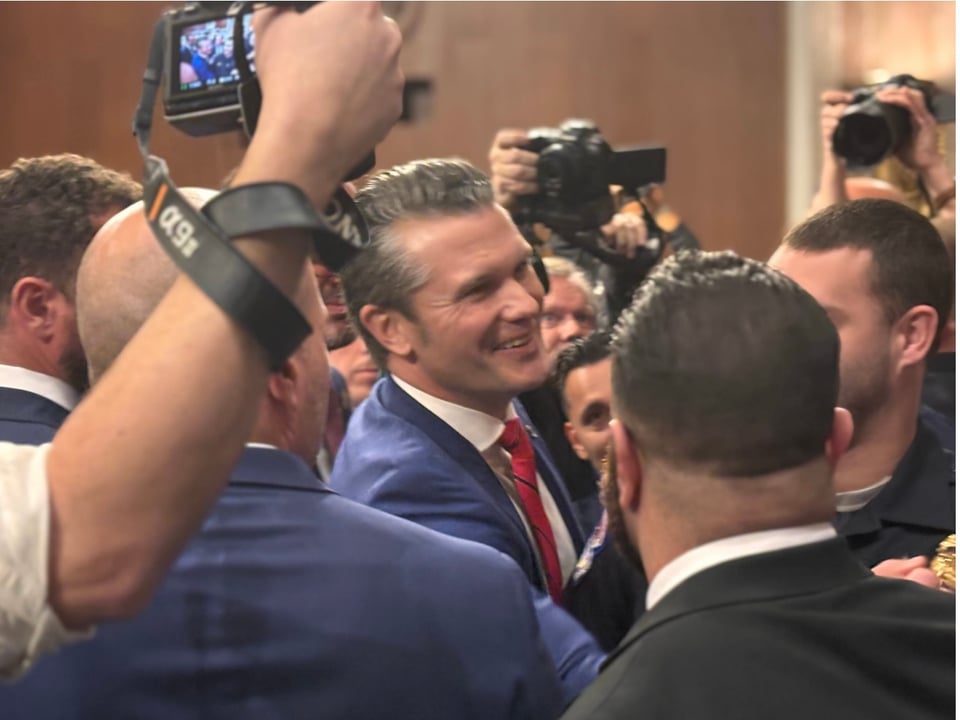
My job for New York in the first weeks of the new year was to cover the Pete Hegseth confirmation process, and last night he got narrowly confirmed by the full senate, with Republicans Lisa Murkowski, Susan Collins and Mitch McConnell voting against him, which meant that JD Vance had to come in and break the tie. It was … excruciating.
In part, for me, that was because I’d been sent to DC to cover the story (that’s my very own photo, above); I had sat in the hearing room for four hours, listened to the expressions of menace, absorbed the intensity of the right wing’s communicative strategy, which—since there was zero professional argument for this nominee—were laser focused on the veneration of brutal machismo.
The hearing covered sexual aggression and waterboarding, neither of which Hegseth ever really disavowed. There was braying about “war-fighters,” a “warrior ethos,” the repeated assertions that women in combat roles were bringing down military standards, though the relentless anti-“DEI” sentiment expressed then and made manifest this week makes clear that this is not just about women, but every kind of person who had forced straight white men to share the spaces over which they used to enjoy exclusive dominion.
The whole point of Hegseth’s confirmation was to convey that a brand of American Man was back in charge, that he can do 5 sets of 47 push-ups, and that he will sneer at (but also destroy) anyone who challenges him—protesters, Democratic senators, journalists, civilians.
That message is permeating everything right now—see today’s clip of Mel Gibson, celebrating Trump’s return as feeling like “daddy has arrived and he’s taking off his belt” or The Federalist suggesting that New Yorker writer Susan Glasser and other journalists still offended by Trump should just “sit back and relax this time.”
But my first exposure to its suffocating ferocity was in that hearing, a week before Trump’s inauguration.
And the thing about the Hegseth nomination is: that ferocity won!
A Fox News weekend host with a history of alcohol abuse and alleged sexual violence and financial mismanagement is now the head of the American military, has the nuclear codes, and how are people who are distressed by this supposed to feel except exactly as they wanted us to feel? Impotent, beaten into submission, helpless and without recourse.
But their victory is not the whole story. Because between hearing and confirmation, Hegseth’s former sister-in-law, Danielle Dietrich Hegseth, submitted a sworn affidavit in which she told of how his rages were so intense that his second wife had chosen a “safe word” to let friends and family know if she felt endangered by her husband; of how her former brother-in-law had once “drunkenly yelled in [her] face” after she’d walked out of the room during a story that had a “racial slant;” of how she’d heard him make misogynistic comments including about how “women should not have the right to vote and that they should not work” and of how once he’d gotten so drunk that he’d dropped glasses on a dance floor and “repeatedly shouted, ‘No means yes!’” (As the Senate was voting on his nomination, Hegseth posted a letter on X, denying many of his former sister-in-law’s claims).
What strikes me as crucial and fortifying and too likely to get obscured by the fact that it didn’t ultimately stop Hegseth’s confirmation is that by submitting that affidavit, this woman took an enormously courageous risk, was far braver than many of us can likely imagine being. It may not have worked, because fighting back against institutional power rarely works, but Danielle Hegseth’s choice shook the process that the right had wanted to remain frictionless and unimpeded.
It mattered that the sworn affidavit reopened the questions that Hegseth’s Armed Services Committee hearing had aimed to slam shut. It mattered that Dietrich Hegseth’s willingness to step up provoked further press coverage, and prompted the FBI to go back to Hegseth’s second wife Samantha, who reportedly told them that her ex-husband “drinks more often than he doesn’t.”
These women’s willingness to speak, when they had been violently warned to keep their mouths shut, in turn made space for those who opposed the nomination in both parties to speak further about this man’s lack of qualifications.
In the end what could have been a smooth 53-47 confirmation became the tense spectacle that almost made me throw up last night, that certainly drew more eyeballs than it would have otherwise, and thus ensured that the Republican party will not be able to deny that they own this guy’s tenure. The challenge forced Republicans to acknowledge that they had encountered non-anonymous evidence of Hegseth’s history and aggressively, consciously, ostentatiously voted for him to run the American military nonetheless, in front of cameras and an audience far larger than they had perhaps planned.
So even though they won, it feels terribly important to note that the swaggering, silencing effect that Hegseth and his supporters tried to enforce did not totally work. Because despite their best efforts, not everyone believed that they couldn’t speak up.
It is also worth noting, in this period when the absence of specifically female challenge in the form of, say, a massive women’s march, has been cited of evidence of a failed or flagging resistance to Trump’s second ascension, that Danielle Hegseth wasn’t alone in her bravery this week. Bishop Mariann Budde looked straight at the president who has improbably taken on Christ-like dimensions in the eyes of his followers and spoke clearly to him of Christian mercy and the humanity of those he is oppressing. And US District Judge Beryl Howell, forced to dismiss the January 6 cases of Proud Boys Nicholas Ochs and Nicholas DeCarlo, refused to do so “with prejudice,” which means that charges could be filed against the men again in the future.
There is nothing purely good to say about these past six days; I remain scared for the safety of these women, and for the millions of other people facing deportation, firing, defunding, dehumanizing political tactics.
But I’ve also thought a lot about the Alice Walker poem that I cited at the start of my 2018 book Good and Mad: “The feminine/is not/Dead/Nor is she/Sleeping…Angry, yes,/Seething, yes…..Biding her time;/Yes./Yes.”
Resistance may be dangerous, but as I reminded myself last night, it appears even now to be far from futile. (Substack).
Alice Walker’s poem quoted above 👆 made me embrace two other great women writers too.
Happy birthday, Audre and Toni.

Audre Lorde.1934-1992.

Toni Morrison.1938-1919.
The fight against censorship and Trump.
60 minutes did this.👇 Watch them all.
President Trump, back in the White House for less than a month, has closed agencies, frozen spending that Congress mandated by law, and challenged the breadth of rights guaranteed by the Constitution. https://t.co/h24oxmduWF
— 60 Minutes (@60Minutes) February 17, 2025
President Trump says USAID is rife with fraud. But Andrew Natsios, a Republican former administrator of USAID, calls that “utter nonsense.” Natsios says USAID is “the most accountable aid agency in the world.” https://t.co/4MwUokAAdX pic.twitter.com/X7hLBiUlYg
— 60 Minutes (@60Minutes) February 17, 2025
In Germany, posting hate speech online is illegal. The law is enforced with pre-dawn police raids. https://t.co/DNAJyNxILt pic.twitter.com/OHvWTVaRjQ
— 60 Minutes (@60Minutes) February 17, 2025
Elon Musk did this.
Musk is shameless. I don’t think he was criticizing Hitler, do you?
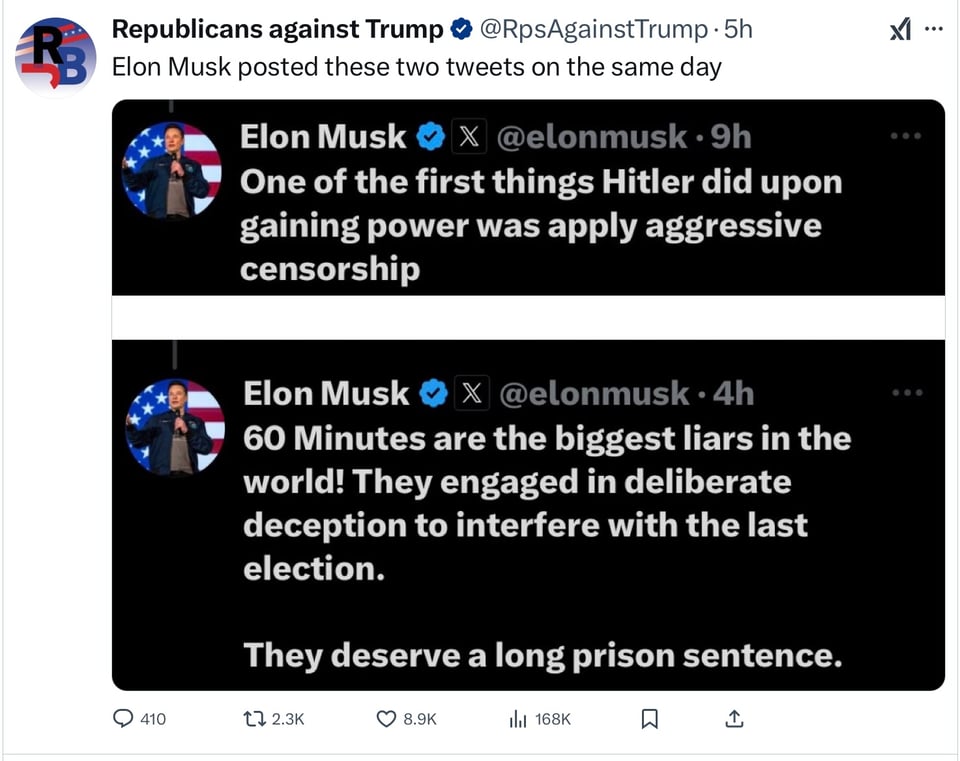
What can you do?
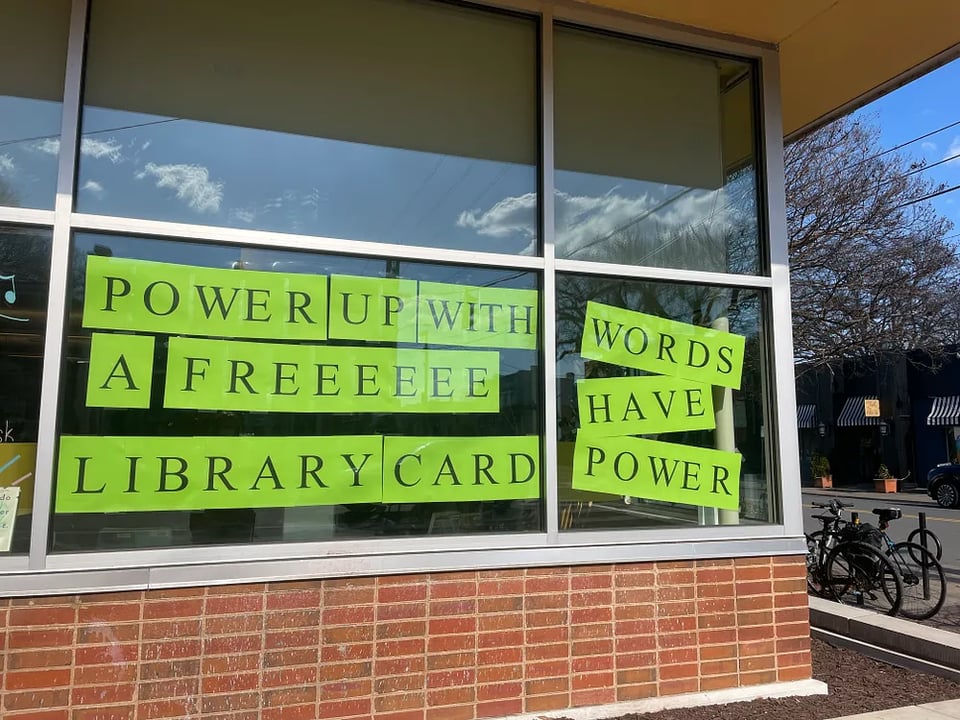
- Support 60 minutes.
- Get a library card.
- Write or call local officials who fund libraries.
- Write supportive letters and emails to media who can broadcast truth and call out lies.
- Post on social media in support of free speech and banned books and against censorship.
- Of course, keep your Elected Officials - red and blue- federal and local - informed.
- Call CNN, MSNBC, NBC, ABC, CBS, NY Times, Washington Post, etc and demand they boycott the White House until the AP is let back in.
Worried that Trump will win cases at the Supreme Court?
He might win this first case 👇 but don’t despair.
It doesn’t mean he will mean the second, or the third, or the twenty-fifth.
Spread the word on this, in conversations and social media. Give people courage that one loss is not the end of the world.
Once again, thanks to Roundup consultant, Linda Wharton, who pointed out this fine piece.
The Court's First Trump II Case Won't Be a Bellwether.
The challenge to Trump's removal of the head of the Office of Special Counsel raises unique procedural and substantive issues likely to prevent it from serving as a referendum—in either direction.
Yesterday afternoon, the first of the dozens of lawsuits challenging actions taken by President Trump and his administration over the past four weeks (yes, it’s only been four weeks) reached the Supreme Court. In Bessent v. Dellinger, the Acting Solicitor General, on behalf of the Department of Justice, is asking the Supreme Court to vacate a D.C. federal judge’s ruling that had temporarily reinstated Hampton Dellinger as the head of the Office of Special Counsel—an “independent” federal agency. The government is also asking the Court to issue an “immediate administrative stay” to pause that ruling and keep Dellinger out of office—a request that neither Chief Justice Roberts (who, as the “Circuit Justice” for the D.C. Circuit, received the request) nor the full Court has yet to act on.
It’s easy to understand why folks will see the Dellinger case as a litmus test for the justices—and will assume that, however the Court rules on the government’s emergency application here will necessarily signal how much (or how little) the justices are going to push back against the rest of the new administration’s actions. My own view, though, is that this is almost certainly a mistake—in both directions. The Dellinger case raises unique procedural obstacles that could foreclose emergency relief to the government without signaling any view of the merits. But it also raises a constitutional argument in support of Trump’s conduct that is stronger in this context than it will be in almost any of the other pending cases. The Dellinger case is important in its own right. But no matter how the Court rules, we shouldn’t view the result as foreshadowing everything (or, frankly, almost anything) else that’s coming.
The One First “Long Read”:
The Uniqueness of the Dellinger Case
To understand why the Dellinger case is unique, it’s necessary to provide some background—on the agency at issue; the constitutional defense of Trump’s conduct; and the procedural posture of the litigation to date.
I. OSC and the Unitary Executive
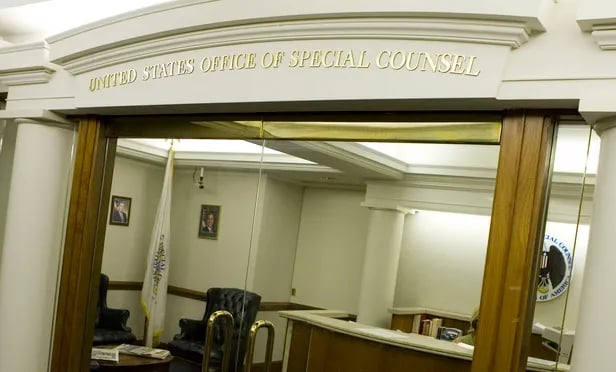
The Office of Special Counsel (OSC) has nothing to do with more famous “special counsels” within the Department of Justice, like Jack Smith. Rather, OSC is an autonomous, “independent” agency within the executive branch—initially created by Congress in the Civil Service Reform Act 1978 as part of the Merit Systems Protection Board, and then given its own legal footing as a standalone agency in the Whistleblower Protection Act of 1989. OSC’s charge is to protect federal employees from unlawful employment-related conduct by the federal government (“prohibited personnel practices”), including but not limited to retaliation against whistleblowers. To that end, OSC is the central office within the executive branch tasked with investigating and pursuing federal employees’ claims of wrongful employment practices. Indeed, Congress created OSC at least largely as an alternative to authorizing employment-related litigation by government employees against the government; the idea was that, instead of opening the litigation floodgates, OSC would clean up the government’s employment-related dirty laundry.2
The head of OSC is “The” Special Counsel of the United States, who, by statute, is appointed by the President (with the Senate’s advice and consent) to a five-year term, and can be removed by the President “only for inefficiency, neglect of duty, or malfeasance in office.” In March 2024, with the Senate’s consent, President Biden appointed Hampton Dellinger as the Special Counsel.
Ten days ago, on February 7, President Trump purported to dismiss Dellinger, although he did not identify any “inefficiency, neglect of duty, or malfeasance in office” that would justify Dellinger’s removal. Instead, Dellinger’s removal was apparently predicated on the view that the for-cause removal restrictions in the Civil Service Reform Act are unconstitutional—after and in light of the Supreme Court’s decisions in Seila Law v. CFPB in 2020 and Collins v. Yellen in 2021.
To make a (very long) story a bit shorter, Congress’s long-asserted power to protect certain Executive Branch officers from at-will removal has long been a bête noire for conservatives—especially those who subscribe to the “unitary executive” theory of Article II. The Supreme Court has upheld “for-cause” removal restrictions for multi-member heads of independent agencies like the FTC; and for “inferior” officers like the independent counsel created by the Ethics in Government Act of 1978. But both of those precedents (Humphrey’s Executor v. United States and Morrison v. Olson) are … despised … by just about all of the justices appointed by Republican presidents. They haven’t been overruled yet,3 but they have been heavily narrowed—especially in Seila Law and Collins. Both of those cases held that removal restrictions Congress had imposed upon the head of an executive branch agency with a single director were unconstitutional—in Seila Law, the Consumer Financial Protection Bureau; and in Collins, the Federal Housing Finance Agency.
Against that backdrop, there’s an obvious argument that the for-cause removal protections applicable to the Special Counsel are also unconstitutional. Indeed, there may well be not just five votes on the current Supreme Court for that conclusion, but as many as seven or eight.
But there are also substantial grounds on which OSC could be distinguished from the CFPB and the FHFA (indeed, the majority opinion in Seila Law itself distinguished OSC)—especially because one of the most important purposes of OSC is to provide a mechanism for federal employees to challenge employment-related actions by political appointees. Not only does OSC thus wield a very different kind of power than the CFPB or FHFA, but if OSC, too, had to be headed by a political appointee, then it would be limited to considering employment claims against rogue executive branch supervisors—rather than challenges to conduct that is sanctioned, directly or indirectly, by the relevant agencies’ leaders. Of course, that’s a policy argument for distinguishing Seila Law and Collins. But as will become important in a moment, it’s hardly a frivolous argument—as recent events underscore.
Thus, were the question only whether the Supreme Court is going to uphold the statute Trump violated when he fired Dellinger, the answer would quite likely be “no.” But the Court isn’t deciding (only) that question; it is deciding whether to grant emergency relief in a context in which the Court of Appeals held that it didn’t even have jurisdiction to hear the government’s appeal.
And that … complicates things.
II. The Non-Appealability of Temporary Restraining Orders
In federal courts (and many state courts), a litigant who needs immediate relief will typically seek a “preliminary injunction” to stop the defendant from continuing to take allegedly unlawful action while the case unfolds. And if that’s not immediate enough, the litigant may seek a “temporary restraining order” (TRO), which is meant to be a more expeditious mechanism for providing urgent relief—in exchange for being limited in duration to 14 days.4
One of the biggest differences between a TRO and a preliminary injunction is that the former is not, in most cases, immediately appealable—whereas the latter is. This has been a matter of some debate for decades, but the consensus has long been that it would cause chaos if grants or denials of TROs were immediately appealable—since many TROs are entered without the other party even being present; even more of them are accompanied by proceedings that are more truncated than what precedes a grant or denial of a preliminary injunction; and, in any event, the (federal) rules themselves limit a TRO’s duration—so that, by the time the appeal can be fully resolved, the TRO may no longer even be in effect (and any harm suffered by the recipient may be brief in duration).
Courts have recognized two contexts in which TROs can nevertheless be directly and immediately reviewed by appellate courts. First, in cases in which the TRO is clearly an abuse of the district court’s authority, appellate courts have granted writs of mandamus to wipe them away—relying upon the All Writs Act for the proposition that they can issue “extraordinary” relief in cases in which the lower court’s error was indisputably clear and causing irreparable harm.
Second, as Sixth Circuit Chief Judge Jeff Sutton has put it, a TRO may also be appealable when it is, in effect, “a litigation-altering and litigation-ending injunction because it gives the parties no ‘meaningful appellate options’ about a significant issue of law given the imminence of an irreversible event—say an execution, or . . . an election.” Neither of these contexts is present here. With respect to mandamus, even if the Supreme Court is likely to strike down the for-cause removal protections in the OSC statute, it hasn’t yet—and, as noted above, there are plausible grounds on which the most on-point precedents could have been (and were) distinguished. As for the contexts in which TROs have been treated as if they’re effectively (appealable) injunctions, this isn’t one of them. The government will be just as able to defend Dellinger’s removal if and when the district court (soon) issues a preliminary injunction as it is here.
Instead, the government’s principal argument in the Supreme Court is that this TRO should’ve been appealable because (1) it’s interfering with the President’s Article II prerogatives; and (2) Judge (Amy Berman) Jackson has already all-but signaled how she’s going to rule on the preliminary injunction. It’s not clear, though, why either of those arguments support a new ground for allowing an appeal that has not hitherto been recognized. Again, if a district court is flagrantly abusing its power through a TRO, mandamus ought to be an adequate remedy. But if the government can’t meet the high burden on the merits for a writ of mandamus, and if an appeal after a grant or denial of a preliminary injunction is meaningfully available (as it is here), the government should have to wait to appeal. That’s what the D.C. Circuit held Saturday night, and the Supreme Court shouldn’t be able to issue emergency relief unless five or more justices believe not only that the government is likely to prevail on the merits, but that the D.C. Circuit’s jurisdictional holding was itself incorrect. That seems a much closer call to me than the number of votes on the Seila Law/Collins issue.
III. Why a Dellinger Ruling Won’t be a Referendum
To be sure, the Trump administration has fired thousands of federal employees in ways that are being challenged on various statutory and constitutional grounds. But of all of these cases, Dellinger’s is at the extreme end of the spectrum with respect to the strength of the government’s position on the merits, for Dellinger is (or, was?) the head of an agency. This is almost certainly why the government has moved so aggressively in this case—and why the Acting Solicitor General was so intent on taking this issue to the Court in this (premature) posture; unlike in so many of the other suits challenging the new administration’s conduct, the government knows it’s playing a relatively stronger hand.
That’s why, even if the Court uses this opportunity to make clear that all Executive Branch agency heads, or even all single agency heads, must serve at the President’s pleasure, that would tell us nothing about lower-level officers within federal agencies, or, even more importantly, non-officer employees protected from summary and/or arbitrary termination by the Civil Service Reform Act and other statutes. In other words, even within the employment context alone, this case is a massive outlier. Certainly, if the Court were to deny emergency relief because it believes Dellinger is going to win (the least likely outcome, in my view), that would put an awful lot of force behind those other employment-related challenges. But the inverse just doesn’t follow. There will be plenty of viable legal challenges to how Trump is trying to eviscerate the federal bureaucracy no matter what the Supreme Court does here.
Likewise, this case has nothing to do with any of the funding/spending-related litigation rapidly working its way to the Supreme Court. As I noted two weeks ago, even the most ardent zealots of the unitary executive theory have not viewed that understanding as extending to a unilateral presidential power to impound federal funds. Likewise, the unitary executive theory has exceedingly little to do with statutory and constitutional limits on the federal government’s power to impose conditions on the recipients of federal funds. Those cases will charge ahead regardless of what happens here, and it’s virtually impossible to see how the disposition in Dellinger could affect them.
It’s not that this case is unimportant; OSC is the federal agency most obviously tasked with protecting the rights of federal employees (which, presumably, is why kneecapping it is such an important part of the administration’s broader effort to hollow-out the federal workforce). The point is just that an order from the Supreme Court granting the government’s application here is almost certainly going to be good for this train only—and will tell us vanishingly little about all of the other cases that are heading for the Court sooner rather than later. Folks who try to read into such a ruling that the Court is going to side with Trump in all, or even most, of those cases will, in my view, be making a serious mistake; it’s entirely possible that Trump loses most of these cases, but wins this one.
The flip side is also true. If the Court denies the government’s application, it will almost certainly be on procedural grounds that are specific to the context in which this particular application arose. Not only would I expect the Court to say as much, but I wouldn’t be surprised, if this is the outcome, for it to be accompanied by a multiple-justice statement respecting the denial that emphasizes how strong the government’s case is on the merits—to put a thumb on the scale of what happens in the district court and D.C. Circuit if this case moves forward. Thus, folks should not take a denial in this case, especially if it’s on procedural grounds, as a harbinger of what’s coming in the future cases either.
I understand why many will be tempted to read into this case some deeper conclusion about where the Court is going. The point of this post is to provide reasons why that temptation should be resisted. Very little that the Supreme Court does or says in Dellinger is likely to bear upon what it does or says in the next Trump II cases to reach the justices. And those cases will get to the Court soon enough. (Steve LeDeck, Professor at Georgetown Law School and editor of the Supreme Court newsletter, “One First.”)
Vulnerable Republican fires warning shot on House budget
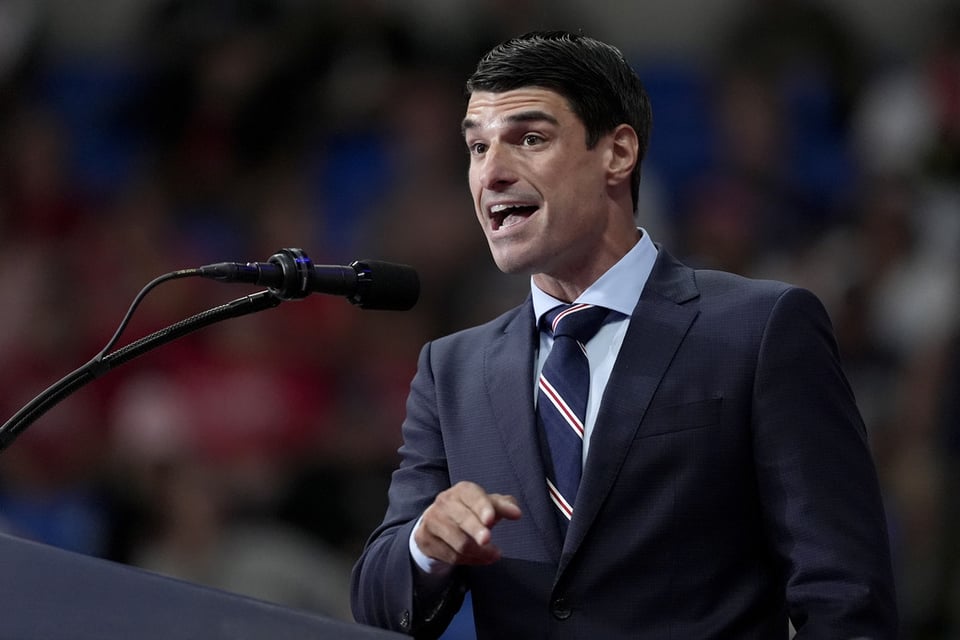
Pennsylvania Rep. Rob Bresnahan is the latest swing-district Republican to issue a warning over deep spending cuts GOP leaders are targeting for key safety net programs in a bill to enact President Donald Trump's massive domestic agenda.
“I ran for Congress under a promise of always doing what is best for the people of Northeastern Pennsylvania,” said Bresnahan in a statement Friday. “If a bill is put in front of me that guts the benefits my neighbors rely on, I will not vote for it. Pennsylvania’s Eighth District chose me to advocate for them in Congress. These benefits are promises that were made to the people of NEPA and where I come from, people keep their word.”
Bresnahan could become a major problem for GOP leadership in the coming days. Speaker Mike Johnson can afford to lose only one vote on any party-line legislation he wants to pass on the House floor. That includes the budget resolution the House Budget Committee advanced Thursday night, which is the first step in allowing lawmakers to move ahead on drafting the measure to enact top legislative priorities through the filibuster-skirting reconciliation process.
But Johnson and fellow GOP leaders are facing rising anger from vulnerable Republicans after agreeing to demands from their hard-right flank to force deeper spending cuts of $2 trillion in the budget resolution — which, if adopted, will dictate how much committees need to cut from programs under their jurisdiction to pay for the larger reconciliation legislation.
That means members will likely have to extract deeper spending cuts across Medicaid, food assistance and other safety-net programs. And Bresnahan, who flipped a blue district in northeast Pennsylvania last fall to help maintain the House GOP majority, is among the growing contingent of centrists blanching at that prospect.
Bresnahan is also part of a group of vulnerable Republicans who privately warned GOP leaders last month to not slash key safety net programs as they look for ways to pay for the sweeping domestic policy bill that spans border, energy and tax cuts.
Johnson, after placating hard-liners to advance his budget blueprint late Thursday, is now facing the immediate challenge of persuading more moderate members to back the plan, which he wants to put on the House floor when Congress returns from recess the final week of February.
GOP leaders have been careful to say they’re not cutting benefits, but rather looking to root out waste, fraud and abuse within Medicaid and other federal aid programs. That’s done little to assuage some Republicans’ concerns, especially as some GOP lawmakers quietly have said that the particularly high $230 billion in spending cuts targeted for the Supplemental Nutrition Assistance Program under the Agriculture Committee will require Republicans to cut current food aid benefits. That would be in addition to expanding work requirements and rescinding other flexibilities for states. (Politico).
--
The New York Times Editorial Board speaks out about Trump and about Eric Adams, mayor of New York.
Refusing to Carry Out Trump’s Flagrantly Dishonest Orders
President Trump’s determination to bend the American justice system to his will, combined with his broad tolerance for political corruption and his abhorrence of checks and balances on his power, slammed hard last week into the commitment to duty, honor and the rule of law shared by a group of federal prosecutors in the Southern District of New York and Washington, D.C. The confrontation between Mr. Trump’s lieutenants at the Justice Department — led by his former personal defense lawyer Emil Bove III — and Manhattan’s interim U.S. attorney, Danielle Sassoon, and her colleagues is the clearest example yet of this administration’s efforts to bake quid pro quo deal making, coercive tactics, loyalty tests and other dishonorable practices into American government and warp its long-held principle of equal justice before the law.
Those tactics are being used not just in Washington but increasingly at the state and city level, too, particularly against local policies that Mr. Trump opposes. In this case, the Justice Department has undermined the ethical and trustworthy governance of New York City by moving to let its mayor, Eric Adams, off the hook for corruption charges brought by Southern District prosecutors, in apparent exchange for Mr. Adams’s acquiescence and support for the Trump administration’s desires, starting with its crackdown on illegal immigration.
This board called on Mr. Adams to resign last September, after the indictment was unsealed; the damage and destabilization now resulting from this devil’s bargain between the mayor and the Justice Department make it only more urgent that Mr. Adams step down. If he does not, he must face an investigation and possible prosecution by state officials. New York City voters will also have an important say in the matter. In the June mayoral primary, they will have to muster the clarity and resolve to stop Mr. Adams if he continues his candidacy for re-election.
What is so alarming about the Trump Justice Department’s actions is that the nation’s top law enforcement officials are bent not just on turning an intentionally blind eye to their peers alleging illegal actions and exploiting the misconduct of a desperate lackey like Mr. Adams for their own purposes but also on corrupting the prosecutors and civil servants in the department itself. That much was clear in letters written by Ms. Sassoon and her Southern District colleague Hagan Scotten outlining the reasons they would not obey the flagrantly dishonest and untenable order to drop the Adams charges from Mr. Bove, the acting deputy attorney general who served (and lost) as Mr. Trump’s criminal lawyer in his hush-money case. The resignation letters by the two prosecutors, both with conservative backgrounds, are compelling declarations of why demands like these from the administration are serious violations of democratic practice, tradition, precedent, decency and legality.
“It is a breathtaking and dangerous precedent to reward Adams’s opportunistic and shifting commitments on immigration and other policy matters with dismissal of a criminal indictment,” Ms. Sassoon wrote to Attorney General Pam Bondi.
“No system of ordered liberty can allow the government to use the carrot of dismissing charges, or the stick of threatening to bring them again, to induce an elected official to support its policy objectives,” Mr. Scotten said in his resignation letter.
Mr. Adams became the first sitting mayor in modern New York City history to face a criminal indictment when he was charged last September with five federal counts, including conspiracy, wire fraud, soliciting illegal foreign campaign contributions and bribery. Since then, he has shamelessly sought to win Mr. Trump’s favor, and the mayor’s lawyers asked for a pardon for him.
In a clear sign that Mr. Trump’s protection comes with expectations, Mr. Adams made an appearance with Mr. Trump’s so-called border czar, Thomas Homan, on Fox News, after the deal was reached. They collegially discussed reopening an Immigration and Customs Enforcement office at the city’s Rikers Island jail, contrary to New York law. Mr. Homan was unusually forthright during the appearance in saying that the administration expected Mr. Adams to comply with its mass deportation efforts.
“If he doesn’t come through, I’ll be back in New York City, and we won’t be sitting on the couch. I’ll be in his office, up his butt, saying, ‘Where the hell is the agreement we came to?’” Mr. Homan said.
Mr. Adams, of course, denies that his intent in courting Mr. Trump was ever to have the federal charges dropped and says that he remains independent. And Mr. Bove and Mr. Adams’s lawyers deny any quid pro quo. But as Ms. Sassoon wrote in her letter, the mayor’s lawyers “repeatedly urged what amounted to a quid pro quo” to federal prosecutors, offering to assist in the president’s immigration enforcement in exchange for dropping the charges.
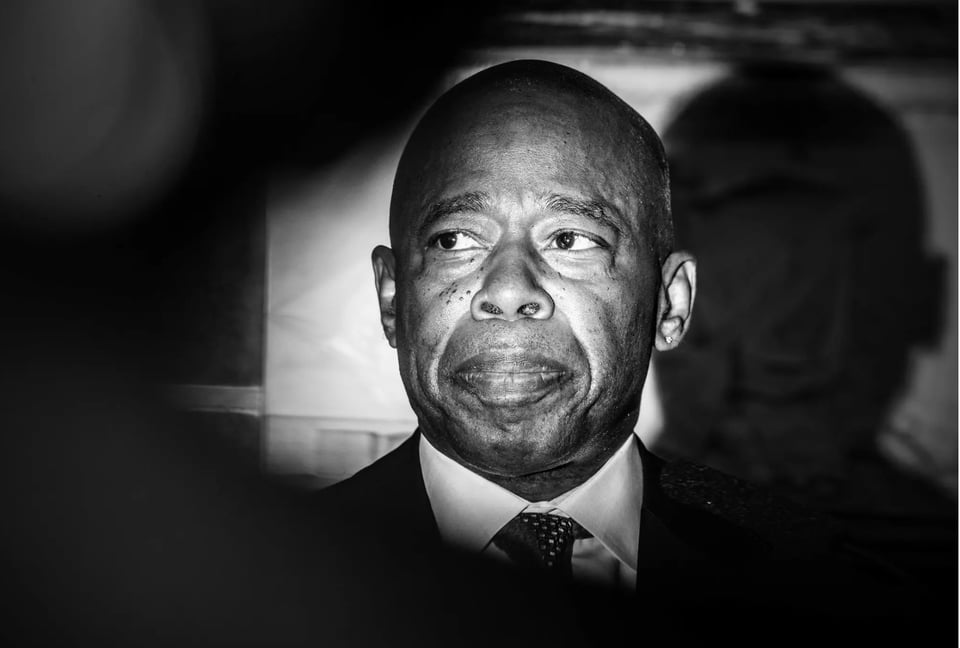
Eric Adams.
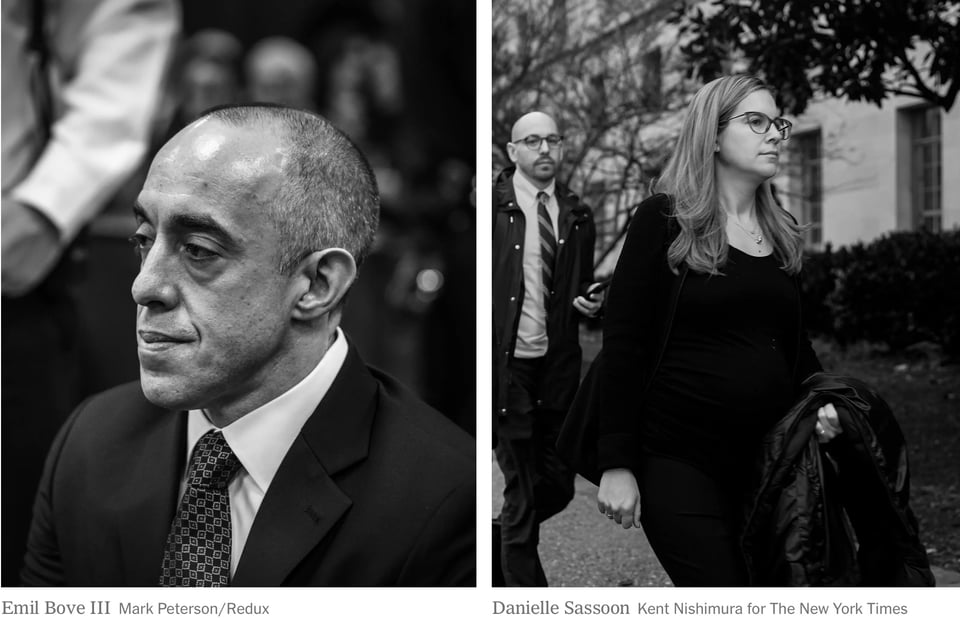
And the deal that the mayor offered “is the nature of the bargain laid bare in Mr. Bove’s memo,” she wrote. In it Mr. Bove wrote that the “pending prosecution has unduly restricted Mayor Adams’s ability to devote full attention and resources to the illegal immigration and violence crime.” It is clear that Mr. Trump’s and Mr. Bove’s claims about the Adams indictment being politicized by prosecutors and the Biden administration are specious. The lawyers installed by Mr. Trump never questioned the validity or seriousness of the charges; their case for dismissal was driven by the mayor’s potential usefulness to the Trump administration.
That follows Mr. Trump’s aggressive use of federal power to squeeze and control officials in realms beyond his reach, from private business to higher education to local government. He has done much the same to federal workers who might demonstrate unwanted independence as they execute their responsibilities or meet their legal and constitutional obligations.
In the case of Mr. Adams, the president and the Justice Department are sending a message that they intend to dispense with the impartiality, precedents, norms and very laws on which the American justice system depends. In seeking dismissal of the charges against Mr. Adams “without prejudice,” the Justice Department is sending the clear message that they can be reinstated, should he stray from the Trump line.
All of this leaves New York City with a mayor plainly unfit for office, whose credible accusations of corruption — let’s remember that five aides or associates of Mr. Adams have been charged as well and that seven others have left office under pressure — are now joined by the strongest possible disincentive to cross the president in any way. If he is loyal to the great city he was elected to lead, he will resign. Many leading New York political leaders have demanded that he do so. Some of them have also demanded that Gov. Kathy Hochul take immediate action to use her legal authority to fire him if he continues to refuse to do so.
Ms. Hochul has wisely resisted that path. At a time when Mr. Trump is so brazenly attacking democratic norms through overreaching assertions of executive branch authority, the idea that she would take the unprecedented step of removing a democratically elected official outside the traditional electoral process is unwise. Though the situations are quite different — Ms. Hochul has the legal authority for such an action, something Mr. Trump has lacked in so many of his early moves — this is not the time for Democratic Party leaders to muddy the waters around respect for democratic norms, especially when they need to make the case against Mr. Trump’s subversion of the rule of law. More appropriately, the City Charter has provisions for a five-member “committee on mayoral inability” to remove him, though the presence of Mr. Adams’s appointees may make this outcome less likely.
In the meantime, Ms. Hochul and other elected officials and leaders in the city, state and Democratic Party — many of whom have called for his resignation — should press Mr. Adams to resign on his own accord. And it will be important for officials, including state prosecutors, to continue to hold him to account for any illegal or unethical moves. (Many of the actions cited by federal prosecutors would also constitute state crimes and could be investigated and charged by the Manhattan district attorney.) If it comes to it, New York City voters will have the final say on Mr. Adams’s political future in the Democratic mayoral primary in June, in which he is likely to be a candidate, or in the general election in November.
Appealing to the better instincts of this new Trump administration — with its open disdain for law and morality — has so far proved a losing proposition. And it would be naïve to hope that the public backlash to this abuse of power will give Mr. Trump and Ms. Bondi real pause about further such abuses in the future. But the efforts of prosecutors, civil servants, elected officials and others to document and decry this injustice and to stand up and even resign in the face of this administration’s transgressions matter enormously. The attempt to dismiss the charges against Mr. Adams must still come before the federal district judge assigned to the case, Dale Ho, and he may yet conduct a thorough inquiry on the government’s action.
If so, the investigations Mr. Bove has threatened against Ms. Sassoon, Mr. Scotten and other prosecutors who defied his order, if held in public, will hardly reflect favorably on the Justice Department. Ms. Sassoon and Mr. Scotten could not be credibly denounced by Mr. Trump as woke or radical — she clerked for Justice Antonin Scalia, a renowned conservative, and is a member of the conservative Federalist Society; he is a decorated Special Forces veteran who clerked for then-Judge Brett Kavanaugh and Chief Justice John Roberts.
In his first term, Mr. Trump was often restrained from his most dangerous impulses by people who knew better. He has taken great care this time to exclude such people from his entourage, leaving it to brave and truly patriotic civil servants to stand up to him, like the seven Justice Department lawyers who resigned rather than carry out the order to drop the Adams indictment.
BREAKING: NY Gov. Hochul just issued a new statement that the resignation of NYC Mayor Eric Adams’ top aides “raises serious questions about the future of this mayoral administration.” and that she’ll convene a meeting tomorrow to discuss the mayor’s future. She isn't ruling out removing Mr. Adams.
— Morgan J Freeman (@mjfree.bsky.social) 2025-02-18T02:43:54.252Z
Maybe you ought not to AirBnB it?
Maybe you ought to share this photo on social media?
